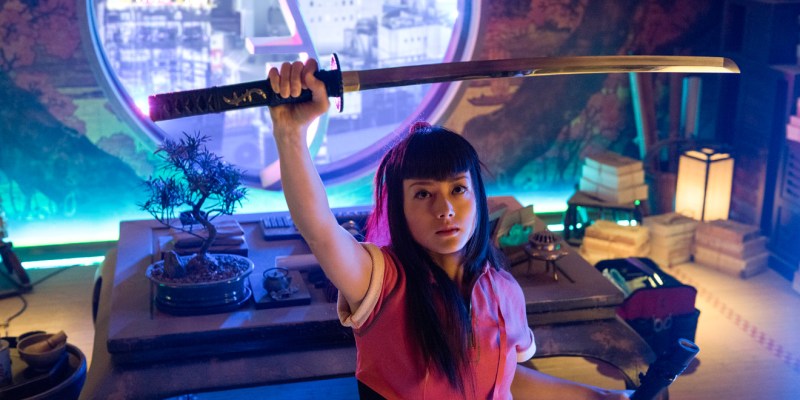In his opening number at the Emmys, host Andy Samberg finds himself in a situation increasingly common in the “golden age” of television: He isn’t caught up on all the hottest shows. While Samberg chooses to seal himself in a vault for a year while he binges away the hours, most of us lack the time or ready access to an underground bunker to do the same. Instead, we are forced to make choices between shows that, years ago, might have been considered must-see. Joining this dog-eat-dog world is “Heroes Reborn,” NBC’s limited series sequel to 2006’s “Heroes.”
Following in the footsteps of show that received such critical acclaim — at least at the start of its run — and competing in a far more difficult landscape, “Reborn” has to prove truly dazzling to survive the critical eye of ravenous fans and spoiled scholars. Occasionally entertaining but not on par with the juggernauts of today, “Reborn” feels less like a modern expansion of the original and more like a direct transplant from its predecessor’s laidback era.
“Heroes Reborn” takes place in the same universe as “Heroes,” one in which evolved humans with special powers live in tense peace with their standard counterparts. At the show’s outset, efforts to improve relations between the two groups are dashed by an evolved terrorist’s catastrophic attack on Odessa, Texas. This event precipitates a global manhunt of evolved humans, in turn forcing the show’s ensemble cast of protagonists, both superhuman and human, onto a collision course with one another as a mysterious “something big” approaches.
Like most shows with an ensemble cast, “Heroes Reborn” struggles to develop compelling characters or realistic relationships. The show’s characters are simply characters: Cardboard cutouts designed to fill a role, rather than believable and fleshed-out human beings. Each protagonist can be boiled down to a single pitch-meeting phrase, from the “tragedy-stricken family man with a mysterious past” to the “geeky teen with untold potential.” Their interactions are as basic as their characterizations, consisting of straightforward sentences which leave as little to the imagination as a hefty man’s Speedo.
While this simplicity might make the show unpalatable to those seeking intellectual fulfillment from their TV, it is not necessarily an absolute weakness. Character development, in terms of screen time, is an expensive gamble that is difficult to execute. This difficulty is compounded by the sheer number of current series which are far less broad than “Heroes Reborn” and are thus able to commit more focus to the growth of and relationships between individuals. Recognizing the core competency of his rivals, creator Tim Kring avoids the minefield of character development altogether, focusing more resources on designing and executing the plot machine in which his characters are merely cogs.
The plot of “Heroes Reborn,” consisting of several interwoven storylines, is far and away its strongest selling point. Capitalizing on the simplicity of the characters, each arc launches explosively and maintains a satisfactory pace as it develops. The inundation of events brings some excitement with it, keeping our bodies just above their resting heart rate for the majority of the show’s runtime. While the stories themselves are neither especially innovative nor altogether surprising, the events move quickly enough to distract from these issues for ultimately “Reborn” is less about what happens than constantly ensuring that something is happening.
Again though, even the plot of “Reborn” is not without its flaws. The more exciting moments are often neutered by too-convenient buildups, challenging the viewer’s suspension of disbelief with characters surviving absurd circumstances and acting in ways which only make sense in the context of furtherance of the story. Moreover, the different storylines steal time from one another, delaying their inevitable intersection and leaving the viewer wanting more commitment to each arena.
Also impeding the plot’s ability to succeed are the show’s deliriously low production values, especially in the program’s action scenes. Gunfights are frequent and potentially exhilarating, but the cast’s apparent lack of understanding of how a gun works and the sound effects which are seemingly played by a laptop off-camera distract from the excitement. The fistfights in “Heroes Reborn,” though better executed, simply cannot compete with sleeker competitors, as seen in shows like Netflix’s “Daredevil.” “Reborn’s” shaky camera techniques, hard cuts, and cheesy motion effects are relics from another time in television filmmaking that, like the show itself, are hard to justify in a modern context.
Though it has its merits, there just isn’t really a place for “Heroes Reborn” in today’s media battleground. “Reborn” is not a bad show. Unfortunately, the world has changed since 2006, and, unlike its predecessor, “Reborn” must fight for its time in the spotlight with shows that are simply better in every way. For those of us with a bunker and a year to kill, it can’t hurt to give “Reborn” a chance, but it is probably not worth the time for those of us who are forced to be a bit choosier.
Contact Ryan Holmdahl at ryanlh ‘at’ stanford.edu.
